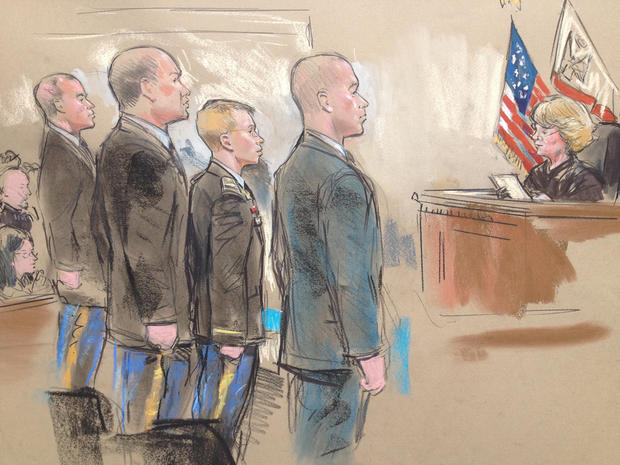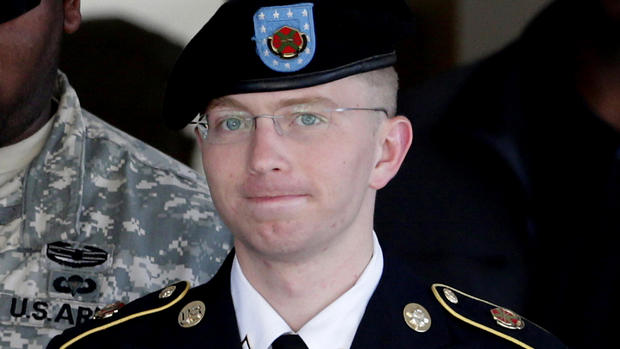Bradley Manning acquitted of aiding the enemy for giving secrets to WikiLeaks
Updated 7:26 p.m. ET
Bradley Manning, the 25-year-old Army private who gave thousands of classified U.S. military and diplomatic documents to WikiLeaks, was acquitted of aiding the enemy in a military court-martial, but was convicted on multiple other counts.
As CBS News correspondent David Martin reported, Manning had chosen to have his fate decided by a judge, Army Col. Denise Lind, rather than a military jury. Col. Lind gave no explanation for her verdict or why she was not convinced by the government's contention that manning knew the material he provided to WikiLeaks would make its way to the enemy.
The charge of aiding the enemy was the most serious of 21 counts. It carried a possible life sentence without parole.
Manning was convicted of six espionage counts, five theft charges, a computer fraud charge and other military infractions. Manning's sentencing hearing is set to begin Wednesday.
Manning pleaded guilty earlier this year to reduced versions of some charges. He faces up to 20 years in prison for those offenses, but prosecutors pressed ahead with the original eight federal Espionage Act violations, five federal theft counts, and two federal Computer Fraud and Abuse Act violations, each punishable by up to 10 years; and five military counts of violating a lawful general regulation, punishable by up to two years each. All told, Manning faces a maximum of up to 136 years in prison for his various convictions. There is, however, no minimum sentencing requirements for Judge Lind to follow.
According to the Associated Press, Manning did not appear to react to the verdict, although his attorney, David Coombs, smiled faintly when he heard not guilty on aiding the enemy.
"We won the battle, now we need to go win the war," Coombs said outside the courtroom after the verdict Wednesday. "Today is a good day, but Bradley is by no means out of the fire."
Manning, a native of Crescent, Okla., had prior to the verdict admitted to sending 470,000 Iraq and Afghanistan battlefield reports, 250,000 State Department diplomatic cables and other material, including several battlefield video clips, to WikiLeaks while working in Army intelligence in Iraq in early 2010.
WikiLeaks published much of the material on its website, as well as in cooperation with several news outlets like The New York Times and The Guardian.
Prosecutors had argued that Manning had a "general evil intent" because he knew the classified material would be seen by and help terrorists. They claimed when Navy SEALs raided Osama bin Laden's Pakistani compound in 2011, they found copies of WikiLeaks documents that Manning had provided. Prosecutors also argued that Manning simply wanted to make a name for himself by leaking the classified material.
Manning himself did not testify during the trial, but in a pre-trial hearing said he wanted to expose what he called the American military's "bloodlust" and disregard for human life in Iraq and Afghanistan, as well as its dishonest diplomacy, and that he carefully selected material that wouldn't put troops in harms' way. His attorney has tried to portray Manning as a whistleblower with good intentions.
Reactions to the Manning verdict have been mostly positive out of Washington D.C.
Rep. Mike Rogers, R-Mich., and Rep. Dutch Ruppersberger, both members of the House Intelligence Committee, released a joint statement after the verdict hailing the multiple convictions.
"Justice has been served today," the statement read. "PFC Manning harmed our national security, violated the public's trust, and now stands convicted of multiple serious crimes. There is still much work to be done to reduce the ability of criminals like Bradley Manning and Edward Snowden to harm our national security."
Manning's supporters, however, were dismayed by Tuesday's verdict. WikiLeaks said on its official twitter feed the conviction on espionage charges was "dangerous national security extremism from the Obama administration."
Following Tuesday's espionage conviction WikiLeaks's founder, Julian Assange, said the conviction against a whistleblower was "dangerous precedent."
"Bradley Manning's alleged disclosures have exposed war crimes, sparked revolutions, and induced democratic reform," said Assange in a statement. "He is the quintessential whistleblower.
"This is the first ever espionage conviction against a whistleblower. It is a dangerous precedent and an example of national security extremism. It is a short sighted judgment that can not be tolerated and must be reversed. It can never be that conveying true information to the public is 'espionage.'"
Many legal analysts said earlier that a conviction of Manning would mark a new precedent in prosecutions of U.S. secret leakers because the Army private never actually shared the information directly to an enemy of the U.S.
"Most of the aiding-the-enemy charges historically have had to do with POWs who gave information to the Japanese during World War II, or to Chinese communists during Korea, or during the Vietnam War," Duke law school professor and former Air Force judge advocate Scott Silliman told the Associated Press.
Manning's supporters have expressed fears that this new turn in leak prosecutions will have a chilling effect on potential whistleblowers of government wrongdoing.
The actual effects of Manning's leaks are still being debated three years later.
One of the videos leaked by Manning included a 2007 U.S. Apache helicopter attack in Baghdad that killed at least nine men, including a Reuters news photographer and his driver. The video inflamed anger among many in the both the U.S. and abroad, because it allegedly showed unarmed civilians being killed, something the U.S. military disputed was incorrectly portrayed due to editing.
Other material leaked by Manning included thousands of confidential diplomatic cables that revealed the frank and often embarrassing discussions America's diplomatic corps had about various world leaders and geopolitics. For a time, there was anger amongst foreign diplomats and governments about some of the exposed secrets, but three years on, the latest series of U.S. government leaks produced by former NSA contractor Edward Snowden have received nearly all of the international outrage towards America's clandestine behavior and actions. An example of one of the many revelations Manning leaked was a diplomatic cable claiming Saudi Arabia -- a key regional ally for the U.S. -- is one of the largest origin points for funds supporting international terrorism.
From the documents Manning leaked that came from the Pentagon, one of the many revelations was that there were 109,032 "violent deaths" recorded in Iraq between 2004 and 2009, including 66,081 civilians, which is 15,000 more than previously reported.

